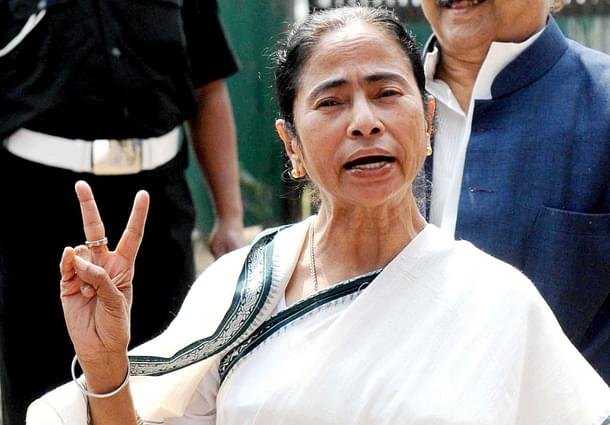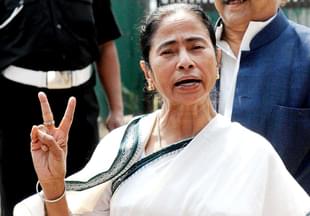Politics
Why Mamata Banerjee’s Stand On Rohingyas Seems Unprincipled
Jaideep Mazumdar
Sep 19, 2017, 04:40 PM | Updated 04:21 PM IST
Save & read from anywhere!
Bookmark stories for easy access on any device or the Swarajya app.


Bengal Chief Minister Mamata Banerjee has, expectedly, strongly opposed the Union government's plans to deport the 40,000-odd Rohingyas, who have sneaked into India over the past few years. She has rooted for granting them refugee status in India on "humanitarian grounds" and has also brushed aside charges that some of the Rohingyas may have been have been radicalised by Islamic fundamentalists and have close links to jihadi groups and terror outfits inimical to India.
But Banerjee's stand on the Rohingyas is an unprincipled one for many reasons. The primary among them being that she has not displayed such 'humanitarian' concern over the displacement of lakhs of Hindus due to persecution in Bangladesh over the decades. Or the ethnic cleansing of the Chittagong Hill Tracts that has forced lakhs of Chakmas to seek shelter in India. Banerjee has never raised these issues.
The Bengal Bharatiya Janata Party (BJP) general secretary Sayantan Basu has alleged that Banerjee's heart bleeds only for Muslims. "Mamata is raising the Rohingya issue and demanding they be granted refuge in India only because they are Muslims. Had they been Buddhists or Hindus, she would not have bothered. Of course, she is cloaking her concern in the false-fig leaf of 'humanity', but that is all bunkum. The real reason is that they are Muslims," said a senior BJP leader, who did not want to be named, since she is not the official spokesperson of the party.
The Hindu Samhati, which has been working for the welfare of Hindu refugees from Bangladesh, finds Banerjee's concern for Rohingyas hypocritical. "Hindus who have been persecuted in Bangladesh and have fled to India have horrendous tales to tell. But Banerjee hasn't, even once, expressed or shown any 'mamata' (sympathy) for them. Her government has not taken a single step to ameliorate their sufferings here. Instead, her party leaders facilitate the entry of Bangladeshi Muslims into Bengal, provide them ration cards and citizenship documents and then ensure they become beneficiaries of various state welfare schemes. That is why her stand on Rohingyas is hypocritical," said Samhati vice-president Devdutta Maji.
Banerjee's concern for the Rohingyas, admit some of her own party leaders, is dictated by the need to keep her Muslim vote bank in the state happy. Especially after the massive show of support by Muslims in Bengal for the Rohingyas. "They (Muslim organisations) rallied nearly 50,000 people in the heart of Kolkata a few days ago in support of Rohingyas. Many influential Muslim leaders addressed the rally and demanded that the Rohingyas be granted refuge in Bengal. Mamata could not have ignored them. There was also a lot of covert pressure on her to express support for the Rohingyas and oppose the Centre's resolve to deport the Rohingyas, who have already entered India," said a senior Trinamool functionary, who is also a junior minister.
Banerjee, while opposing the Centre's contention that many Rohingyas have terror links and pose a security threat to India, said: "Let the (Union) government take steps against those who have terror links. But the misdeeds of a few cannot be generalised. We need to distinguish between terrorists and commoners". Banerjee seems unaware of the depredations of the Rohingyas in the Rakhine province of Myanmar. The Rohingyas – all of them migrants from what is now Bangladesh, who started migrating to Rakhine province in the 15th century – have terrorised the Rakhines through rape, forcible conversions and destruction of Buddhist temples in the province, and the same has been documented in history. On the other hand, the Myanmar army too has been accused of using rough methods to deal with the Rohingya unrest in Rakhine.
It is suspected, with good reason, that many Rohingyas supported Islamic outfits that had demanded the integration of Rakhine province with erstwhile East Pakistan and, more recently, independence for the province and its declaration as an Islamic state. Over the past two decades, Wahhabi fundamentalist outfits and terror groups funded by Saudi petro-dollars have struck roots with the Rohingyas and have succeeded in radicalising some of them them.
"Many of the Rohingyas are Islamic fundamentalists. They follow Wahhabism and they are supporters of an independent Islamic Rakhine state. There are few moderates among the Rohingyas and if some of them now speak in a moderate voice, that is only to gain sympathy. Even Rohingya children have been found guilty of desecrating Buddhist temples and even killing Rakhines," said a former Intelligence Bureau officer, who has thorough knowledge of the Rohingyas.
Banerjee, of course, may not know this. "She doesn't have access to the alarming intelligence inputs on the radicalisation of the Rohingyas, on their support for terror outfits, on how many such outfits supported by Pakistan have recruited many Rohingyas and on the grave security threat the Rohingyas pose to India," said a Union Home Ministry officer, who liaises with intelligence agencies. Hindu Samhati's Maji says that even if Banerjee were to be briefed about the security threat the Rohingyas pose to India, she may not be convinced because her judgment may be clouded by the need to protect her Muslim vote bank.
Security and intelligence agencies say it is difficult to identify the radicals or the terrorists amongst the Rohingya refugees for the simple reason that they are yet to be infiltrated. “We don't have informers among them and have not been able to infiltrate into that community since they are extremely strongly-knit and suspicious. They will not reveal any information on one of their own. And Islamic fundamentalists in India have also reached out to them, assured them of support and protection. This has made the Rohingyas who have already infiltrated illegally into India an emboldened lot, who are immune to pressures from security agencies. So it is impossible to ferret out the terrorists from among them," said an IB officer.
That is why, added the IB officer, all Rohingyas are being treated as suspects. "There are few 'commoners' or innocents among them. Suggestions that the terrorists among the Rohingyas be identified and isolated are highly impractical," said the officer.
Banerjee's stand, driven by local vote bank politics, is not quite in the interests of the country. It seems unprincipled.
Jaideep Mazumdar is an associate editor at Swarajya.





